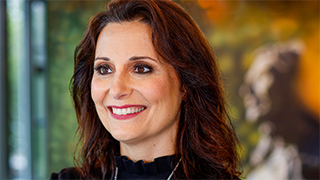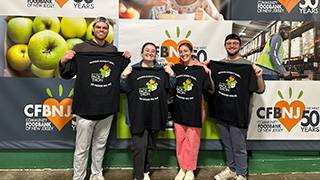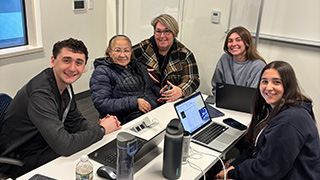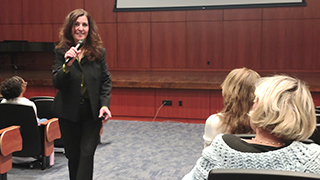Seton Hall Alumnus Roger Newman, M.D., Credits Brownson Speech and Debate Team for Success as Medical Director and Author
Tuesday, February 18, 2025
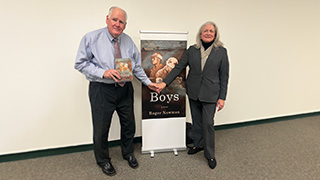
Seton Hall Alumni Roger and Diane Newman
Alumnus Roger B. Newman returned to campus on February 5 to celebrate the launch of his fifth book, entitled Boys. During the event, Newman commended Seton Hall and celebrated Seton Hall Brownson Speech and Debate Team. Newman is a nationally celebrated specialist in Obstetrics and Gynecology and member of the faculty at the Medical University of South Carolina. His path to becoming a doctor and later an author was paved at Seton Hall, enriched by the skills he learned as a member of the Brownson Speech and Debate Team. A scholarship to debate enabled Newman to attend Seton Hall, and the education was outstanding.
“I excelled at medical school,” noted Newman, “not because I was smart, but because our whole first year of medical school, everything I had learned at Seton Hall,” he said. “I was so well prepared here at Seton Hall, that’s a huge thank you.” The Brownson Speech & Debate Team is currently directed by Associate Professor and Department Chairperson in the Department of Communication, Media, and the Arts, Catherine Zizik, and is housed within the College of Human Development, Culture and Media, led by Bryan Crable.
Newman’s visit last week was initiated by a 2024 conversation in his hometown of Charleston, SC with Seton Hall’s Jon Hogan, director of Development, and Dean Crable. The three talked about Newman’s time as a student debater at Seton Hall, and whether he would be interested in returning to the Hall to support the Brownson Speech and Debate Team. “I was very honored to be asked, although I don’t think I have any of those skills anymore,” Newman demurred. They also discussed, recalled Newman, his “evolution, my midlife crisis of wanting to be an author, and before I knew it, I was invited up here to come and talk with you.”
Newman’s new novel explores how brotherhood is more than skin deep in the post-Reconstruction South. Boys tells the story of Pete and Alex, brothers by circumstance, who are raised together on a dairy farm in the Great Smoky Mountains during the Great Depression. Ignorance and racism are daily occurrences, particularly for Alex, who is Black - an orphan taken in by Pete’s father.
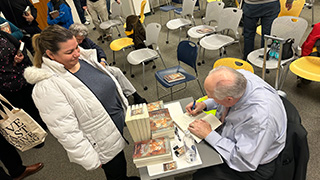
Roger Newman signing books at the event on February 5
Inspired by writer Pat Conroy, a fellow South Carolinian who wrote best-sellers like The Prince of Tides, and Samuel Shem’s 1978 satirical medical intern novel, The House of God, Newman realized he had a passion for writing. Boys, released January 14, was 30 years in the making. In addition to Boys, Newman is the author of a series of medical thrillers: Occam’s Razor, Two Drifters, What Becomes, and the historical fiction novel Will O’ the Wisp: Madness, War, and Recompense.
Newman, who grew up in Columbia, South Carolina, and attended Seton Hall as an undergraduate biology major in the 1970s, says the book is part true story and part historical fiction. It was “very loosely based on” his father Pete Newman’s early life experience on Newman’s grandfather “Poppa” Barnes’ dairy farm, and how “Poppa” took in a Black boy named Alex after the Ku Klux Klan killed his family. Boys turns fictional once Pete and Alex grow up and enlist in the Army. “The central question of the novel,” said Newman, “is whether the bonds of love and fraternity between the two brothers are stronger than the powerful and divisive forces of racism and racial intolerance that characterized the time and place that they lived in during the South.”
Newman spoke to an intimate audience in Walsh Library at the event sponsored by the University Libraries and the College of Human Development, Culture and Media, touchingly comprised in part of several of his Seton Hall fraternity brothers and his wife, Diane, in the front row. Newman thanked Professor Zizik, who invited Mrs. Newman to attend one of Brownson’s practices the prior evening. He praised the debaters also in attendance, calling them “impressive and talented.”
In speaking about Boys, Newman shared that the troubles of the deep South were magnified and made real when Alex entered his family’s life. Though Mr. Barnes told Alex he was part of the family, Alex was called only “Boy” by everyone in Pete’s family except for Pete himself. Made to work hard on the dairy farm as a farmhand to earn his keep, Alex still experienced the prevalent confines of segregation. “My family was not magnanimous, and my grandfather just wanted another farmhand, but my father and Alex were the same age and became friends - and brothers,” Newman told the gathered audience.
Later, after enduring what Newman calls the “rigid theology and racism” of “Poppa” Barnes, the two boys leave home to join North Carolina’s Old Hickory Division in anticipation of war in Europe. Segregation prevails, and Army policy separates the brother-friends. The family saga follows the brothers over five decades beginning during the Great Depression and continuing during WWII battles, up through their reunion in 1969 on the night of the Vietnam anti-war protest movement, following the brothers through extremely difficult times.
“The struggles of those times were magnified for Pete and Alex because Pete was white, and Alex was Black,” said Newman. “They had to overcome together the tragedies of economic collapse of the Great Depression, severe poverty in rural western North Carolina, ultimately war and grievous injuries of the Korean War, and the tumultuous times of the ‘60s - and they had to overcome these things while dealing with what was a rigid color line.”
Categories: Arts and Culture

